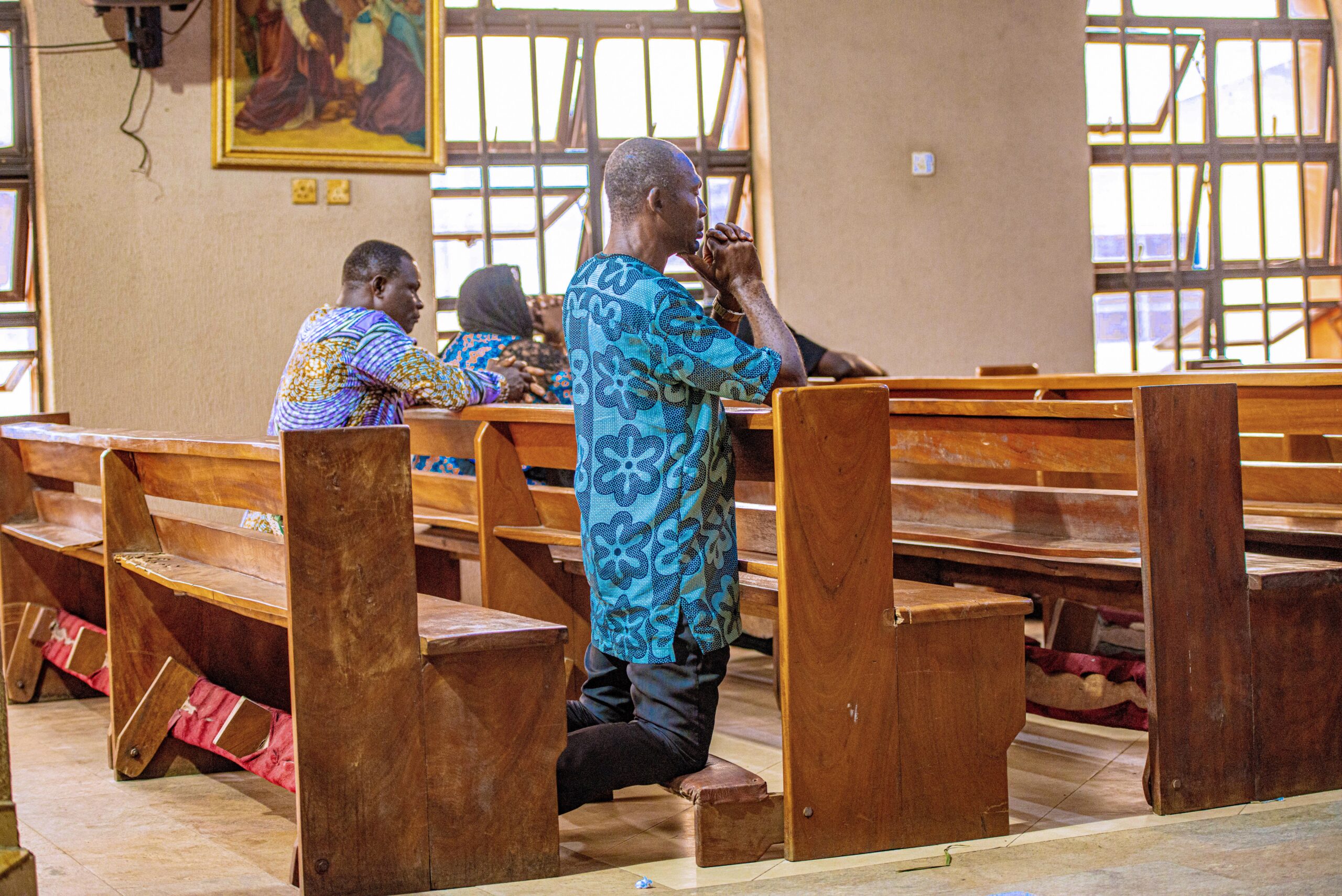
Man prays in a Catholic Church in Benin City, Nigeria. PHOTO BY DAVID ILOBA
News
Violence in Nigeria is personal for priests serving in the archdiocese
June 30, 2023
Horrific memories haunt Father Joseph Kwasau from his 36 years as priest in Nigeria.
Like in 2000 when he dressed in camouflage and pretended to be a soldier to fend off rioters and protect Church property in Nigeria.
“When I look back at what happened and the risk I took in protecting the Church and Parish House from the rioters while the crisis lasted, I shudder,” he later wrote in his autobiography, “The Amazing Grace.”
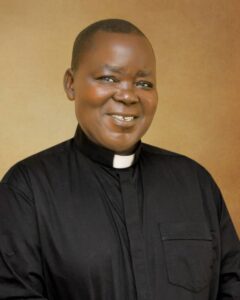
Father Joseph Kwasau
Father Kwasau – a priest of the Archdiocese of Kaduna, Nigeria, who’s now associate pastor of St. Mary Parish in Bellevue – recalled another bout of rioting that year.
That’s when he surrounded himself with soldiers and ventured out to gather dead bodies and bring them to a morgue and to collect food and clothing for refugees.
A different violent encounter left Father Kwasau with “a graphic mental picture” of a man being hacked to death by a mob. “Nothing could be more troubling than watching a fellow human – a good member for that matter – scythed to death and you are completely incapable of offering help,” he wrote.
“There were too many of them for me to dare to attempt any intervention. I had to watch them in pain and listen to him cry for help with none arriving until he was silenced.”
In 2019, Father Kwasau was targeted for assassination. The sound of his dogs barking, gunshots and yells from a security guard awoke him around midnight that night.
“My security man was shouting, was calling, trying to draw attention,” Father Kwasau said in an interview. The guard was killed instantly.
“The attackers tried to enter my house, but praise God, they were not able to break in” to the heavily reinforced home, he said. “They were intending to just come in and kill me, not to kidnap me.”
“I had to relocate because they said they were coming back.”
Still the violence was difficult to escape. A nephew was kidnapped for two weeks. Five priests from his diocese have been killed.
This is what religious persecution and other nonreligious violence in Nigeria looks like. And for Father Kwasau and other native Nigerian priests serving in the Archdiocese of Omaha, it’s deeply personal.
U.S. Catholics just commemorated National Religious Freedom Week 2023, June 22-29.
The U.S. Conference of Catholic Bishops designated special days throughout the week to pray, reflect and act to promote religious freedom for particular groups of people. June 26 was set aside to pray for religious freedom in Nigeria.
The long-running violence there threatens “the very survival of the nation,” according to the Catholic Bishops’ Conference of Nigeria.
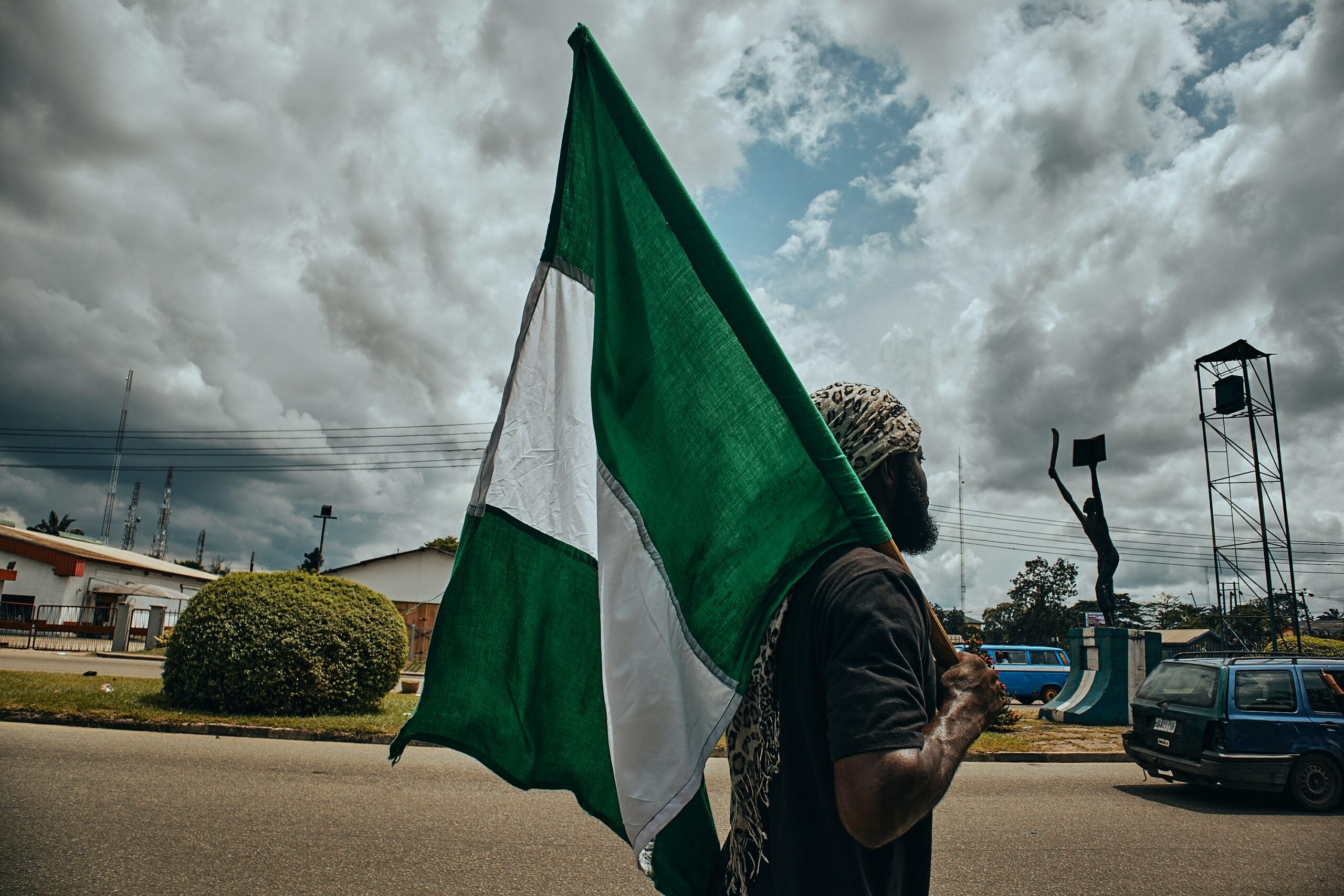
A Nigerian man carries a flag during a protest. EMMANUEL IKWUEGBU | UNSPLASH
RISING VIOLENCE
Armed extremist groups like Boko Haram and Islamic State in West Africa have committed mass atrocities in northern Nigeria. Since 2011 violence has escalated between mostly Muslim herding communities and mostly Christian farming communities, according to news accounts. Armed banditry also has grown, displacing hundreds of thousands from their homes.
The violence has been rising steadily for the past 25 years, said Father Vitalis Anyanike, an archdiocesan priest and pastor of Our Lady of Lourdes-St. Adalbert Parish in Omaha.
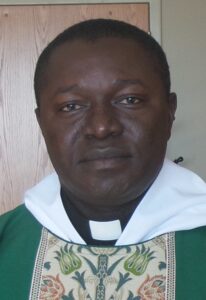
Father Ahmadu Michael Gadache
“At one point northern Nigeria was troubled,” said Father Ahmadu Michael Gadache, a priest of the Diocese of Mina in Nigeria who has served as associate pastor of St. Pius X Parish in Omaha and will be the new pastor of St. Bernard Parish in Omaha. “But right now, it’s everywhere in Nigeria. It’s just that some places are more dominated by the evil activities.”
Some of the terrorists use religion as a pretext for the violence, he said.
The Muslim-Christian conflict has been going on for a long time. “But over the years now, it is very clear that people only use the guise of religion to carry out their evil activities,” Father Gadache said.
In Niger State, where Father Gadache is from, most families are a mix of Christians and Muslims. “So it becomes very evident that there are those who simply use religion to perpetrate their evil activities. Sometimes it’s politically inclined also.”
“At the end of the day, I personally think it’s just one group coming with different faces,” he said. “They carry guns, sophisticated guns and weapons. Their mode of operation is the same: really violent.”
Roving bandits “attack communities, they take people away. They kill those that stand in their way. If they kidnap you, they’ll ask your family for a ransom. And if your family doesn’t have money to give, you are not likely to resurface. They’ll kill you.”
Mostly, there are no consequences for their actions, Father Gadache said. “Justice does not seem to be served.”
Father Gadache is mourning the death of a beloved relative and fellow priest who was shot and killed earlier this year in a parish rectory in Nigeria. The relative, Father Isaac Achi, had survived a 2011 church bombing.
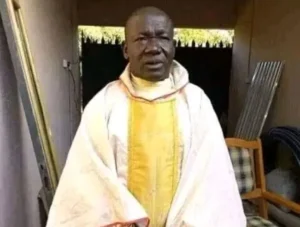
Father Isaac Achi
PHOTO BY FATHER STEPHEN DANIEL / THE PILLAR
Father Gadache said Father Achi was distantly related to his family, but their relationship was close.
“He called me his nephew, and I called him my uncle,” Father Gadache said. “He called my mom his sister. So he’s not a stranger to me. He’s both a brother priest and a close family member.”
He described his relative as a “likeable fellow, hardworking, committed to his duties, a priest who could be relied on. He worked in tough and difficult conditions.”
Father Achi was 61 when he was killed. He had faced other dangers before his death.
On Christmas Day in 2011, his church, St. Theresa’s Parish in Madalla, was attacked. A suicide bomber drove into the church, denotating the bomb at the entrance, killing 46 people and injured more than 100.
The pastor was not in the church at the time. An associate pastor had been celebrating the Mass.
Even before the Christmas attack, Father Achi had been at a couple’s house to celebrate a new baby when there was an attack at the house. He was shot, with a bullet grazing his face and cracking a tooth.
After the bombing, Father Achi was kidnapped but freed hours later.
“Then, because of all these troubles, the bishop asked him to go on a sabbatical leave, to rest from all the troubles,” Father Gadache said. “So at his return, he was assigned to this area (Kafin Koro) where he finally died.” Father Gadache said.
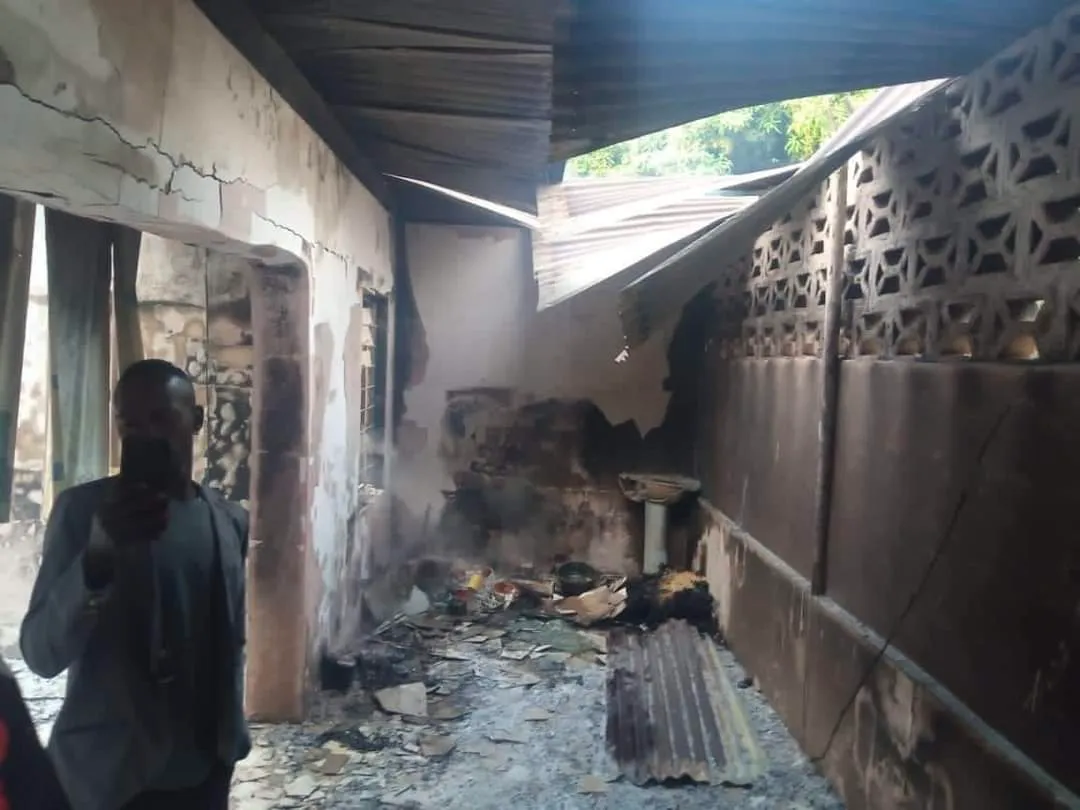
The body of Father Isaac Achi was found in the burned rectory at Sts. Peter and Paul Church in Kafin Koro, Nigeria, after a Jan. 15 attack. FATHER STEPHEN DANIEL/THE PILLAR
MISSIONARIES
Father Anyanike also knew Father Achi well and grieves the death of his friend.
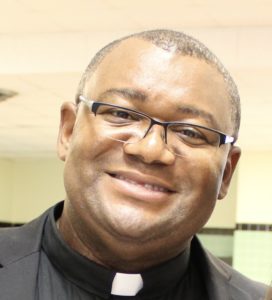
Fr. Vitalis Anyanike
He said he remains concerned about the safety of the religious community he founded, Ad Gentes Missionaries, who “are working directly in the midst of these senseless killings.”
“I’m well familiar with the continuing violence in Nigeria,” Father Anyanike said.
The missionaries operate schools, help provide drinking water and health care and offer food, clothing and shelter to refugees of the violence. They serve everyone, Christians and Muslims alike, Father Anyanike said.
On at least two occasions, fear of violence has forced the missionary brothers, sisters and priests to evacuate, but they courageously return, he said.
Some people have warned Father Anyanike not to visit his missionaries in Nigeria.
“It’s unsafe, and I know that,” he said. “But I do go, I do visit. I support those missions. … It’s just not enough to say keep up the good work where you’re far away. You have to be on the ground, because that’s the mission. That’s where the people are. So I go.”
Nigerians in general are hopeful, Father Anyanike said. “They want to see a peaceful community, a peaceful nation.”
“Many people are victims of the violence,” Father Gadache said. “It’s not just priests, to be fair. In many instances, both Christians and Muslims and anyone else, have fallen victims. … Anybody who is in their way becomes a victim.”
Father Achi’s death became widely known because he was a priest. “But there are very many people who die every day. Nobody tells the stories, nobody hears about it,” Father Gadache said.
“People live in fear. You cannot go about your normal business. Even being in your own home is no longer safe. It’s been a very scary atmosphere out there.”
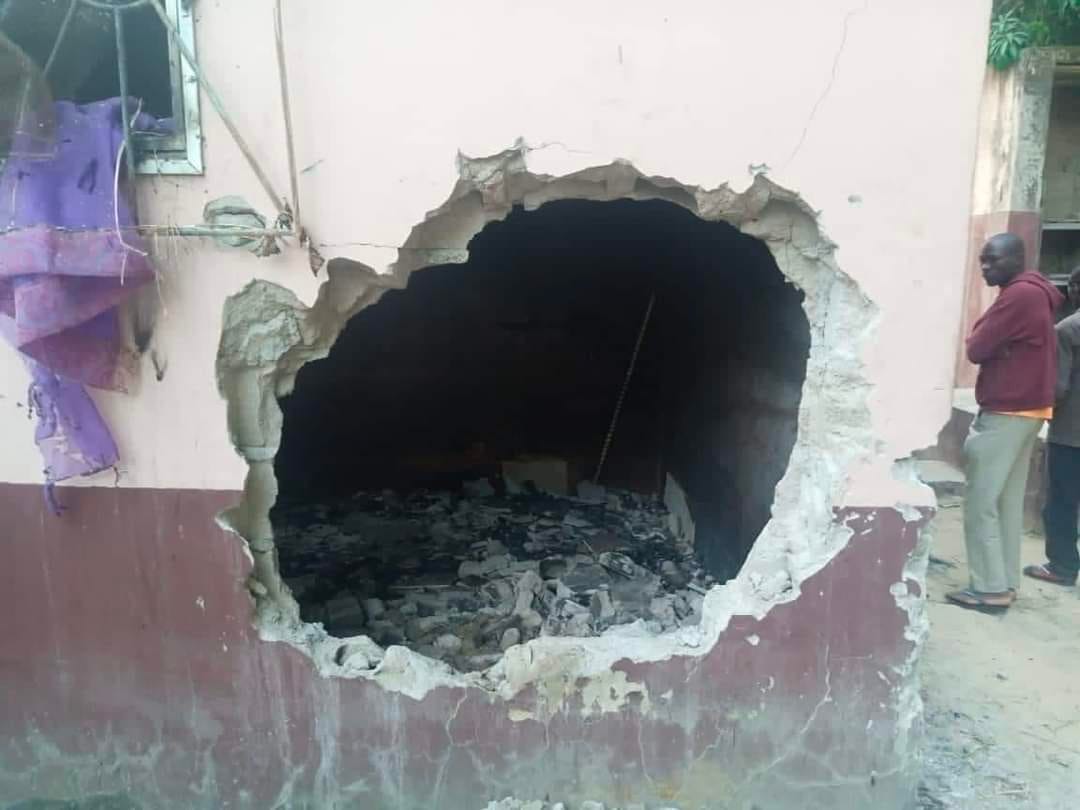
A hole is ripped into an exterior wall of the burned rectory at Sts. Peter and Paul Catholic Church in Kafin Koro, Nigeria, during a Jan. 15 attack by suspected terrorists. FATHER STEPHEN DANIEL/THE PILLAR
PRAYERS, FORGIVENESS
Father Gadache’s mother had to leave her village to relocate to a safer place. She went back to her village for Christmas and decided to stay for some time, but had to rush back to her new home because of an attack in the village. A priest friend rescued her.
“When your people are under constant attack, it gives you a lot of worry,” her son said. “All we do here is pray for better days, pray for peace.”
Most of Father Gadache’s family remains in Nigeria.
“Then there’s the diocese I am ordained as a priest for,” he said.” I have worked in different parishes back in Nigeria, different communities. So one way or the other, the people I had encountered in my work as a priest are all under attack.”
Father Gadache said he has forgiven the terrorists who killed his relative.
“I am a teacher of the faith. I am a Gospel preacher,” he said. “So I will always teach the value of forgiveness and try to live it out as well. So that makes it kind of easy, but it’s not an experience to forget. It’s painful.
“These kind of things will breed evil,” he said, “because there are those who are too wounded, and they’re likely not to forget this experience. And there will be revenge in the future.
“So it’s easy for me, easy for priests, easy for us as a Catholic diocese to preach forgiveness. But what about our people who don’t have the same capacity as us? They are wounded, constantly wounded. It’s very tough.”
“We just have to depend on God and keep praying,” Father Kwasau said.
“Prayer is the key to very many things.” Father Gadache said. “We believe that God is still in charge. God knows all of this.”
He said the Catholic Church in Nigeria reaches out to all victims, Christians and Muslims.
“As a Church, we always try to help out, to bring relief to our people because one of the first places people run to when there are such troubles is the Church. You run to government, you don’t get answers. So people easily go to places they know they’ll be received.”
“We have to leave our arms open for all.”
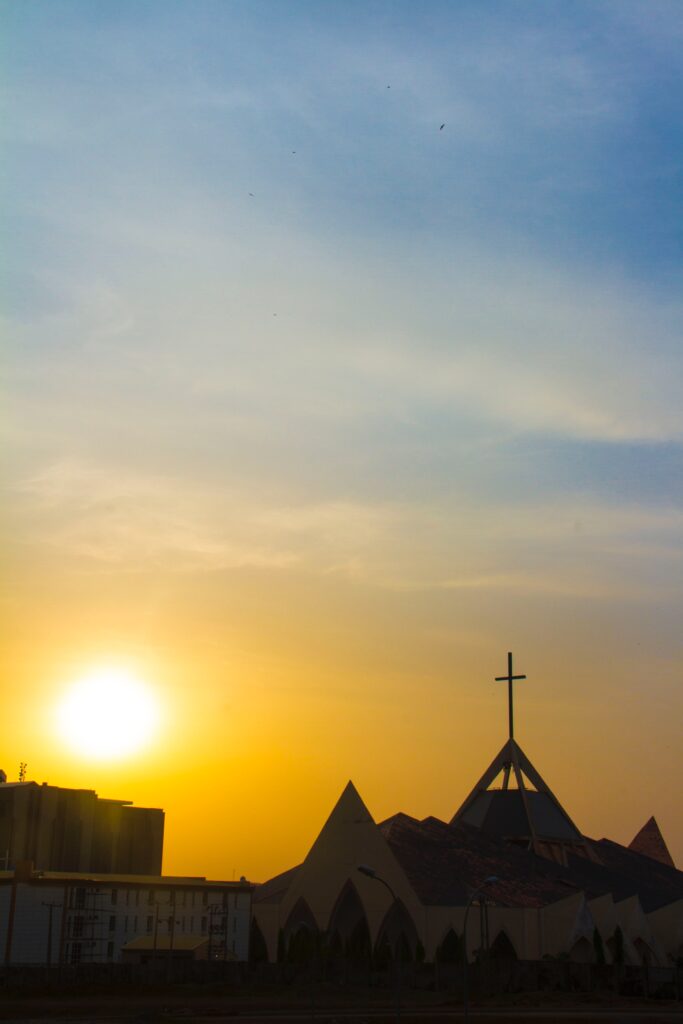
The sun sets over the Nigerian capital of Abuja. AANU OGUNDIPE | UNSPLASH